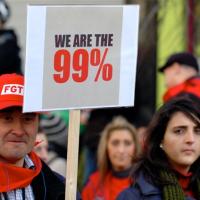
"The demonstration on Friday showed a huge discontent. This is the beginning of a movement, we now need to continue."
540 days after the election, and some 900 days before the next general election, the new Belgian coalition government led by Elio Di Rupo (PS, Francophone “Socialist” Party) is set to take office. Before the official appointment of the new PM and the ministers on Monday 5 December, some 80,000 trade union members demonstrated in Brussels on December 2 in opposition to the proposed cuts.
The proposed measures to cut back €11.3 billion will mainly hit the most vulnerable. Young people looking for their first job, older workers who need early retirement and unemployed people are amongst the first targets of the new government. It is clear that all the other workers will soon follow once these measures are passed. The neo-liberal coalition party, the Flemish Open VLD, has already said that the indexation of wages (automatic pay rises linked to inflation) needs to be “reformed”.
The proposed cuts include: €2.3 billion worth of cuts to the health services, young unemployed people having to wait 12 months under strict conditions before they have the right to unemployment benefit, the unemployed will see their benefits reduced – already half of them live in poverty -, early retirement becomes more difficult with the earliest possibility being at the age of 62 after having worked 40 years (which is almost impossible for young people today given job insecurity), the railways will lose more than 10% of their state support, and the list goes on!
Resistance against the cuts is necessary. The workers’ movement has to be prepared: a chain is only as strong as its weakest link. If the government is able to break the unemployed, youth and pensioners, then they will hit the rest of the working class next. The three trade union federations reflected this by organising a massive demonstration on Friday 2 December.
The media and the employers were furious. A federation of small Flemish employers even started a counter-action on the internet under the slogan ‘we are not on strike’. That is even before there was an appeal for strike-action coming from the unions, for despite calling a demonstration on 2 December to take place during working hours, no actual “strike” was called.
The employers, media and traditional parties all agree: “we” need to cut back to keep the markets quiet, to do what Europe demands and to defend “our” economy. Protesting against the cuts would “not be responsible”. So much for democratic rights! For them it is out of the question that those who have caused the crisis – the capitalist bankers, speculators and bond holders – would pay for it. Some symbolic measures from the big companies only serve to create the illusion of a balanced approach in which “we all pay”, while it’s clear that workers and their families have to take the biggest share.

"We won’t pay their crisis"
The new government will be made up of 6 parties: the three traditional political “families” (Christian democrats, social democrats and liberals) in both language groups (French and Flemish). For the first time in many years the prime minister will be a French speaking social-democrat, Elio Di Rupo. With the social-democrats and Christian-democrats in the government, the ‘preferred partners’ of the three trade union centres are organising and leading the cuts against which were protested against on Friday.
This raises the question of political representation. Will the trade union leadership give the rightwing a monopoly on the political opposition to this government? The main opposition party, the Flemish nationalist N-VA, is calling for more severe cuts while they could try to present themselves as being opposed to the federal cuts being imposed on the Flemish region.
We defend the need of a new mass workers party to unite all those who oppose the cuts and fight for an alternative to capitalism. We support any step in this direction. That is why we participate in Rood (‘Red’), a new movement around Erik De Bruyn who recently broke with the Flemish social-democrat SP.a. The French speaking FGBT union leaders shouldn’t limit their anger against the PS to words.

The demonstration on Friday showed a huge discontent. This is the beginning of a movement, we now need to continue. The French speaking metalworkers’ union leader Nico Cué earlier proposed to go for a 24-hour strike in January, followed by a 48-hour strike in April and if necessary a 72-hour strike in June. While the struggle must not be stretched out over too long a period, Cué’s proposal for continuing and mounting struggle is a good agenda if it’s worked out democratically with information and mobilisation meetings on the work floor. Shop stewards could use this longer period to activate the broader sympathy amongst the community. The unions should also take steps toward coordinated Europe wide actions, workers all over Europe are being hit with the same kind of attacks.
LSP/PSL members got a very good response on the demonstration with a newspaper headlined “Strike against cuts”. We made clear that this demonstration was just the beginning. We need to continue and build a resistance against all cuts in the workplaces and in the communities. We will also need to build such a resistance on a political level. Opposition against all cuts raises the need for a socialist alternative to the capitalist system and its logic.

Be the first to comment